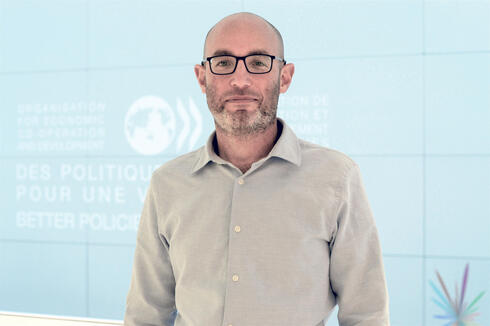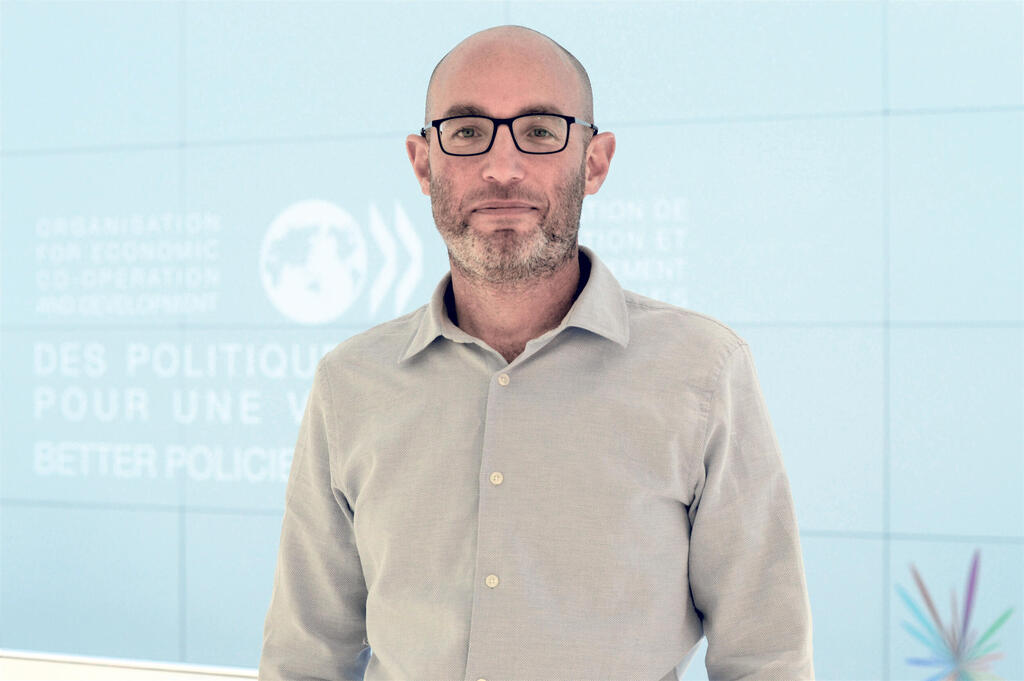
“The Israeli economy is in a difficult situation, but it’s unrealistic to expect business as usual during a year-long war”
Ori Schwartz, Israel’s top official at the OECD, discusses the economic challenges of war and the global competition landscape.
Attorney Ori Schwartz heads the Competition Division at the OECD, making him the most senior Israeli currently working at the organization. Schwartz joined the OECD, based in Paris, in 2021 after more than a decade of holding senior positions in Israel's public sector. He served as Chief Legal Counsel at the Ministry of Health and the Competition Authority and was acting Director General of the Competition Authority in 2015, following the resignation of Commissioner Prof. David Gilo, who stepped down due to his refusal to approve the controversial gas framework.
During his time at the Competition Authority, Schwartz played a key role in drafting the Law for the Promotion of Competition in the Food Industry—part of a series of laws enacted over the last decade aimed at improving Israel’s food market. "Israel's starting position isn't great," Schwartz notes. "We are a small country with an island economy, highly dependent on imports, not only of finished goods but also raw materials. As elsewhere, there is a strong attachment to brands, and the willingness to pay more for brand names allows manufacturers to charge higher prices. New market entrants face significant challenges if consumers prefer sticking with brands they know and trust. There’s a price to pay for that."
When discussing the recently approved import reform, Schwartz highlights a key question: how willing is a country to trust other nations' standards? "There’s a legitimate tension between opening markets by accepting that what works for Europe works for us, and relying on our own public health experts who believe we have the best standards. It's the government's job to decide where it wants to draw the line. If competition is the priority, the direction is clear. But it always boils down to how much you are willing to compromise to promote competition."
Regarding El Al and its monopoly during wartime, Schwartz points to a more complex scenario. "Currently, Israel’s aviation market is competitive, but wartime conditions turn El Al into a monopoly. What do you do in such situations?" He adds, "If it’s a government priority, then intervention is necessary. Security concerns and foreign airlines halting flights to Israel are not new; they just happen more frequently now. Suddenly, a competitive market is reduced to dependence on one large Israeli airline and two smaller ones. This situation repeats itself over and over."
Schwartz emphasizes that while the Competition Authority can take action in isolated cases, it cannot bring in new players or airlines or control prices retrospectively. He says, "Perhaps it’s time to think about re-nationalizing an airline in cases where aviation becomes an essential product controlled by only a few. Or the government could choose to regulate prices. These are questions that need to be addressed with foresight."
On Israel’s highly centralized banking system, Schwartz says, "We haven’t conducted an international comparison, but banking raises significant competitive issues in many countries. Wherever banking is involved, the tension between stability and competition arises. The Strum Committee was set up because a finance minister decided that it was a priority. If a future government prioritizes competition in banking, much more can be done."
Reflecting on his time as acting Director General at the Competition Authority, Schwartz defends his decision against the Mizrahi Tefahot and Bank Igud merger, a ruling later overturned by the court. "I wouldn’t have decided otherwise, but it’s good to have a court overseeing these matters," he says.
Schwartz’s appointment to the OECD in 2021 marked a significant moment in Israel’s relationship with the organization. The OECD is a prestigious international economic body, sometimes referred to as the "club of rich countries," because members must meet strict economic standards. Israel joined in 2010, three years after beginning talks with the OECD. Schwartz explains, "The OECD sets standards in many areas, from economic fields like competition, taxes, and trade to social sectors like education and health. These standards give policymakers a broad, multidisciplinary perspective. Since joining the OECD, Israel’s policies have consistently improved."
Schwartz notes that membership in the OECD is more than just symbolic. "It’s a commitment to certain policies, and being part of the organization gives the country an important international identity."
He acknowledges that Israel has not always followed the OECD’s recommendations, particularly on issues like tax system reform. "Implementing recommendations is a long process, and each country faces unique challenges. The OECD can’t force countries to adopt its guidelines, but the overall benefit is immense."
As the most senior Israeli in the OECD, Schwartz reflects on the current geopolitical tensions and their impact on his role. "The situation in Israel adds complexity, but the OECD remains a friendly environment for Israel. I’ve encountered empathy, not hostility," he shares.
Discussing his work in the OECD’s Competition Division, Schwartz outlines his role in managing a committee of competition authorities from all 38 member states. Together, they address pressing issues like competition in digital markets and the emerging challenges posed by generative AI. "The introduction of AI has raised questions about the future of competition in this space, especially if a small number of tech giants control the market," he warns.
As Israel faces ongoing challenges, Schwartz believes the country would still be accepted into the OECD today. "Israel is in a difficult situation, but no country could face these challenges without paying an economic price. It’s unrealistic to expect business as usual during a year-long war," he concludes.















